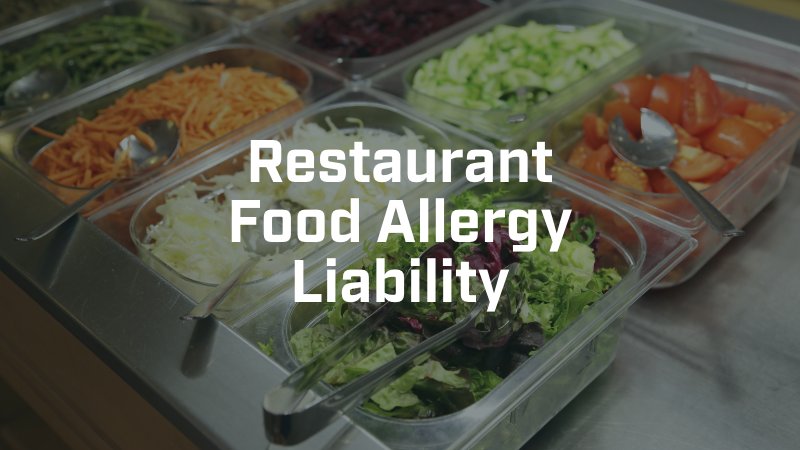Restaurant Liability for Food Allergies
For individuals with food allergies, dining out can be a daunting experience fraught with risks. Restaurants, as food providers to the public, have a crucial role in ensuring the safety of their patrons. Addressing food allergies in restaurants is a matter of public health and a legal and ethical responsibility.
Common Food Allergens
A wide range of foods can trigger allergic reactions, but certain allergens are more commonly associated with food allergies. These include peanuts, tree nuts, dairy, eggs, shellfish, fish, wheat and soy. Some people’s allergy is very severe and can result in death.
Proper Food Labeling and Menu Transparency
Restaurants have a duty to provide clear and accurate information about the ingredients used in their dishes. Proper food labeling and menu transparency are essential for ensuring that customers with food allergies can make informed choices. This includes:
- Detailed Ingredient Lists: Menus should list all ingredients, including common allergens, used in each dish. Special attention should be given to highlight the presence of major allergens like nuts, dairy, shellfish, soy, eggs, wheat, and fish.
- Allergen Statements: Menus should include allergen statements, such as “contains peanuts” or “prepared in a facility that processes tree nuts,” to alert customers about potential allergens.
- Clear Menu Notations: Use symbols or specific sections on the menu to indicate allergen-free options or to note which dishes contain common allergens.
- Online Accessibility: Ensure that allergen information is also available online for customers who wish to review it before visiting the restaurant.
Staff Training on Food Allergies and Cross-Contamination Prevention
Effective management of food allergies in restaurants hinges on comprehensive staff training. All staff members, from kitchen personnel to servers, should be knowledgeable about food allergies and trained in cross-contamination prevention. Key training components include:
- Understanding Food Allergies: Educate staff on food allergies, the severity of allergic reactions, and the importance of preventing exposure to allergens.
- Identifying Allergens: Train staff to recognize common allergens and understand where they might be found in ingredients and dishes.
- Preventing Cross-Contamination: Teach proper food handling procedures to prevent cross-contamination, such as using separate utensils, cutting boards, and cooking surfaces for allergen-free dishes.
- Emergency Protocols: Train staff on responding to allergic reactions, including recognizing symptoms and administering emergency care like epinephrine auto-injectors, if available.
Communication Protocols with Customers Regarding Food Allergies
Clear and proactive communication with customers about their food allergies is vital. Establishing robust communication protocols ensures that customers feel safe and confident dining at the restaurant. Effective communication strategies include:
- Asking About Allergies: Train servers to routinely ask customers if they have any food allergies when taking orders.
- Noting Allergies on Orders: Implement a system to mark orders with allergen information so that kitchen staff know the need for special preparation.
- Customer Reassurance: Provide customers with assurance that their allergy concerns are taken seriously and that steps will be taken to avoid cross-contamination.
- Accessible Information: Ensure that customers can easily access allergen information and that staff are available to answer any questions they may have about ingredients and preparation methods.

Safe Food Preparation Practices to Avoid Cross-Contamination
Preventing cross-contamination in the kitchen is critical to protecting customers with food allergies. Implementing safe food preparation practices involves:
- Dedicated Equipment and Areas: Use separate utensils, cutting boards, and cooking surfaces for allergen-free dishes. Consider designating specific areas in the kitchen for this purpose.
- Thorough Cleaning Protocols: Regularly clean and sanitize kitchen equipment, surfaces, and utensils to remove any traces of allergens.
- Proper Food Storage: Store allergenic and non-allergenic ingredients separately to avoid accidental contamination.
- Ingredient Control: Use clearly labeled containers and strictly control ingredients to prevent mix-ups.
Implementation of Allergy-Friendly Menus and Options
Offering allergy-friendly menus and options can significantly enhance the dining experience for customers with food allergies. This involves:
- Allergen-Free Menu Items: Develop a selection of dishes that are free from common allergens, and clearly mark these items on the menu.
- Customizable Dishes: Allow customers to modify dishes to exclude certain ingredients or allergens.
- Transparency in Preparation: Be transparent about how allergen-free dishes are prepared, and ensure customers know the measures taken to avoid cross-contamination.
- Continuous Improvement: Regularly review and update menu items and preparation practices based on customer feedback and evolving best practices in food allergy management.
By diligently implementing these responsibilities, restaurants can create a safer dining environment, build customer trust, and minimize the risk of allergic reactions. This proactive approach not only safeguards patrons’ health but also enhances the restaurant’s reputation and customer loyalty.
Next Steps
Failure to accommodate customers with food allergies can lead to severe allergic reactions, resulting in medical emergencies, financial burdens, and emotional distress. Moreover, negligence in managing food allergies can expose restaurants to legal liabilities, including food allergy lawsuits and regulatory penalties. Therefore, it is imperative for restaurant owners and staff to be knowledgeable about food allergies and to implement robust measures to prevent allergic reactions.
Contact the Lange Law Firm today if you’ve been impacted by food allergies and a restaurant was at fault. Call (833) 330-3663 or message us online for a free consultation. Our food allergy lawyers can help fight for the justice you deserve.
